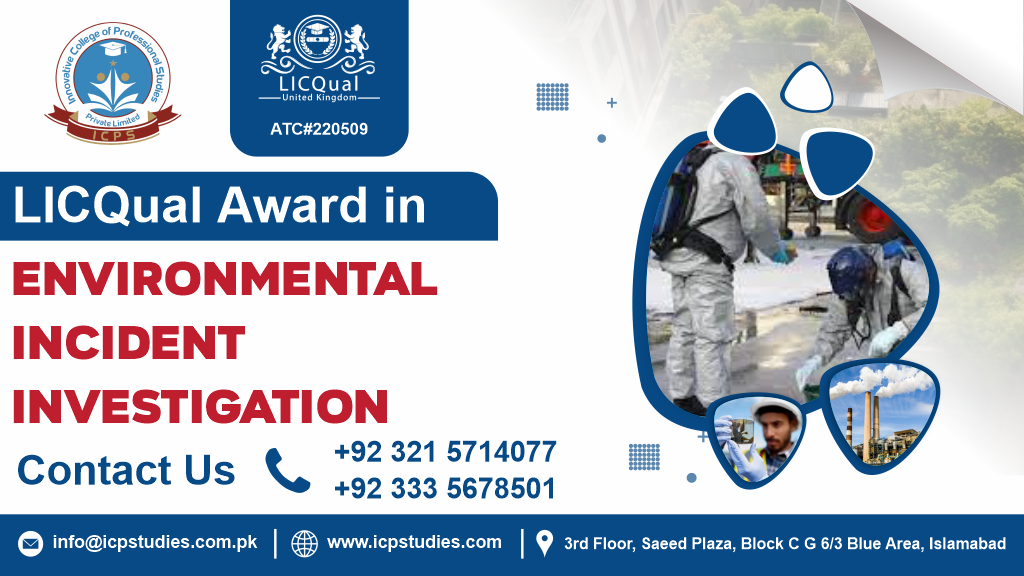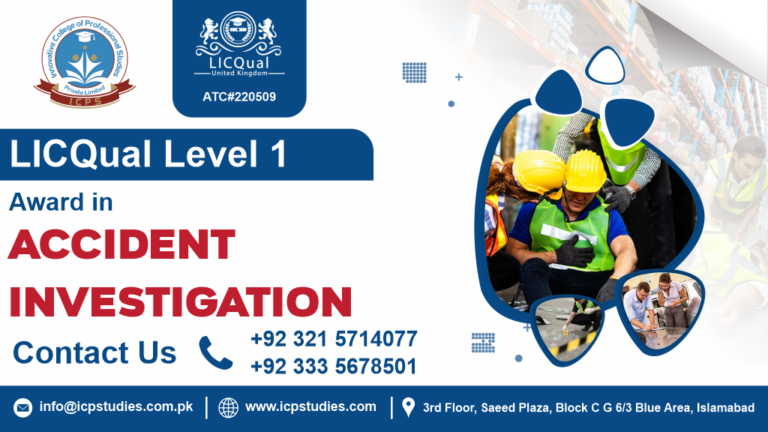Our program covers everything you need to know to become an expert in environmental incident investigation. From understanding regulatory frameworks to mastering forensic techniques, we leave no stone unturned in preparing you for real-world scenarios.
Developed in collaboration with industry experts, our curriculum is designed to meet the demands of today’s environmental sector. You’ll learn from professionals who have firsthand experience in investigating and mitigating environmental incidents.
Theory is important, but nothing beats hands-on experience. That’s why our program includes practical training modules where you’ll work on simulated environmental incidents, honing your skills in data collection, analysis, and reporting.
Upon successful completion of the program, you’ll receive the LICQual Award in Environmental Incident Investigation, a prestigious credential that will set you apart in the job market and open doors to exciting career opportunities.
Don’t wait for accidents to happen—take proactive steps towards safety excellence today. Your journey begins here. Enroll now in the LICQual Award program today and join the ranks of professionals making a difference in safeguarding our planet.
All About Award in Environmental Incident Investigation
Course Overview
The LICQual Award in Environmental Incident Investigation is a prestigious certification program designed to equip individuals with the knowledge, skills, and expertise needed to effectively investigate environmental incidents. Developed by LICQual (Leading in Compliance and Quality), this award is recognized globally as a mark of excellence in the field of environmental compliance and enforcement.
The program covers a comprehensive curriculum that encompasses various aspects of environmental incident investigation, including regulatory compliance, evidence collection, data analysis, and report writing. Participants learn from industry experts who provide insights into real-world scenarios and share best practices based on their practical experience.
Upon successful completion of the program, participants are awarded the LICQual Award in Environmental Incident Investigation, a credential that signifies their proficiency in conducting thorough and effective investigations into environmental incidents. This accreditation not only enhances their professional credibility but also opens doors to career advancement opportunities in environmental compliance, law enforcement, consulting, and auditing.
Overall, the LICQual Award in Environmental Incident Investigation is ideal for individuals passionate about environmental protection and justice, providing them with the necessary skills and certification to make a meaningful impact in safeguarding the environment for future generations.
Study Units
Learning Outcomes
Here are the expected outcomes for each of the study units:
- Introduction to Environmental Incident Investigation:
- Understand the fundamentals of environmental incident investigation.
- Identify the different types of environmental incidents and their potential impacts.
- Familiarize with the basic principles and methodologies used in environmental incident investigation.
- Legal and Regulatory Framework for Environmental Incidents:
- Gain knowledge of relevant environmental laws, regulations, and policies.
- Understand the roles and responsibilities of regulatory agencies and enforcement authorities.
- Learn how to navigate legal frameworks and ensure compliance during environmental incident investigations.
- Environmental Risk Assessment and Hazard Identification:
- Develop skills to assess environmental risks and identify potential hazards.
- Understand the principles of risk management and mitigation strategies.
- Learn how to prioritize risks and hazards based on their likelihood and severity.
- Evidence Collection and Preservation:
- Learn best practices for collecting, documenting, and preserving evidence at environmental incident sites.
- Understand the importance of chain of custody and maintaining integrity throughout the evidence collection process.
- Develop skills in using tools and techniques for evidence collection, such as photography, sampling, and documentation.
- Data Analysis and Root Cause Identification:
- Acquire knowledge of data analysis techniques for environmental incident investigation.
- Learn how to analyze environmental data to identify patterns, trends, and potential causes of incidents.
- Develop the ability to determine root causes and contributing factors of environmental incidents.
- Incident Response and Mitigation Strategies:
- Understand the principles of incident response and emergency management.
- Learn how to develop and implement effective mitigation strategies to minimize the impact of environmental incidents.
- Acquire skills in coordinating response efforts with relevant stakeholders and agencies.
- Reporting and Communication in Environmental Incident Investigation:
- Develop skills in writing clear, concise, and comprehensive reports on environmental incident investigations.
- Learn how to communicate findings and recommendations effectively to stakeholders, including regulatory authorities and the public.
- Understand the importance of transparency and accountability in reporting environmental incidents.
- Case Studies and Practical Exercises:
- Apply theoretical knowledge and skills learned throughout the program to real-world case studies and practical exercises.
- Gain hands-on experience in conducting environmental incident investigations under simulated conditions.
- Enhance problem-solving and decision-making skills through interactive learning experiences.
Admission Criteria
To ensure that participants in the LICQual Award in Environmental Incident Investigation are adequately prepared and equipped to excel in the program, the following entry requirements are established:
- Educational Background:
- A minimum of a high school diploma or equivalent qualification is required.
- Preferred educational backgrounds may include degrees or diplomas in environmental science, environmental management, law enforcement, forensic science, or related fields.
- Professional Experience:
- While no specific professional experience is mandatory, applicants with relevant work experience in environmental compliance, law enforcement, consulting, auditing, or related fields will be given preference.
- Experience in roles involving investigation, risk assessment, data analysis, or regulatory compliance is highly beneficial.
- Language Proficiency:
- Proficiency in the language of instruction (typically English) is required to ensure effective communication and comprehension of course materials.
- Applicants may be required to provide evidence of language proficiency through standardized tests or other means, depending on the institution’s requirements.
- Computer Skills:
- Basic computer literacy, including proficiency in using word processing software, spreadsheets, and internet research tools, is essential.
- Participants should be comfortable using computers for data analysis, report writing, and online communication during the course.
- Commitment and Motivation:
- Applicants should demonstrate a strong commitment to environmental protection and justice.
- A genuine interest in investigating environmental incidents, solving complex problems, and making a positive impact on the environment is essential.
- Ethical Standards:
- Applicants must adhere to high ethical standards and demonstrate integrity, honesty, and professionalism in their conduct.
- A commitment to upholding ethical principles in environmental incident investigation and reporting is required.
- Technology Requirements:
- Access to a reliable computer with internet connectivity is necessary for participating in online components of the course, such as virtual lectures, discussions, and assignments.
- Participants should ensure they have access to necessary software and tools required for data analysis and report writing.
These entry requirements aim to ensure that participants have the necessary foundation, skills, and motivation to succeed in the LICQual Award in Environmental Incident Investigation, thereby maximizing their learning outcomes and professional development opportunities.
Ideal Candidate
The LICQual Award in Environmental Incident Investigation is designed for a diverse range of professionals who are passionate about environmental protection and justice. This course is particularly suited for:
- Environmental Professionals: Individuals working in environmental management, sustainability, conservation, or related fields who wish to enhance their skills in investigating environmental incidents and ensuring compliance with environmental regulations.
- Law Enforcement Officers: Police officers, environmental law enforcement agents, and other law enforcement professionals seeking specialized training in environmental incident investigation to effectively enforce environmental laws and regulations.
- Regulatory Officials: Government officials, inspectors, and regulators responsible for monitoring and enforcing environmental compliance within their jurisdictions who want to deepen their understanding of investigative techniques and best practices.
- Consultants and Auditors: Environmental consultants, auditors, and advisors who wish to expand their expertise in conducting thorough environmental incident investigations and providing valuable insights to clients.
- Risk Management Professionals: Professionals involved in risk assessment, emergency management, and disaster response who recognize the importance of understanding environmental risks and hazards and mitigating their impacts.
- Students and Researchers: Students pursuing degrees or research in environmental science, environmental law, forensic science, or related disciplines who are interested in gaining practical skills and knowledge in environmental incident investigation.
- Professionals Transitioning Careers: Individuals looking to transition into a career focused on environmental protection, enforcement, or consulting who seek specialized training and credentials to support their career goals.
- Any Individual Concerned About the Environment: Anyone with a genuine interest in protecting the environment and ensuring accountability for environmental incidents, regardless of their professional background, can benefit from gaining knowledge and skills in environmental incident investigation.
Overall, the LICQual Award in Environmental Incident Investigation is suitable for individuals at various stages of their careers who are dedicated to making a positive impact on the environment through effective incident investigation, enforcement, and compliance efforts.
FAQs about Award in Environmental Incident Investigation







